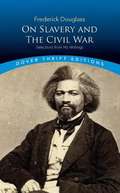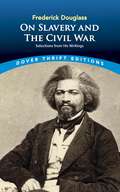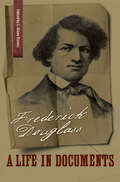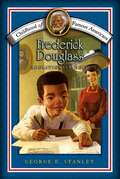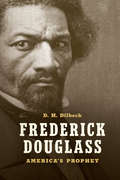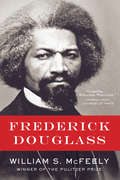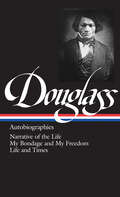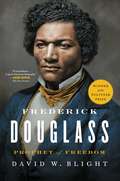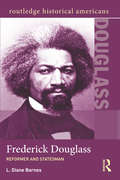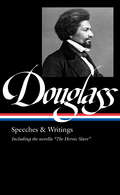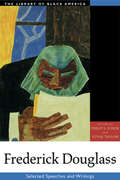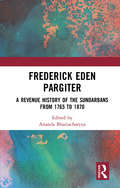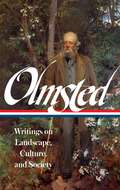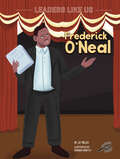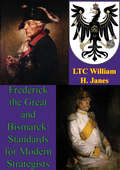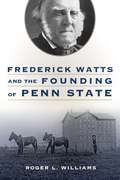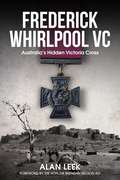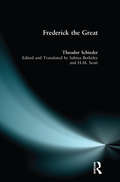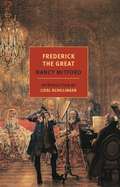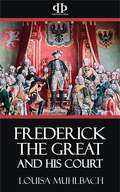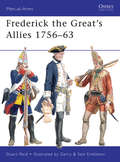- Table View
- List View
Frederick Douglass on Slavery and the Civil War: Selections from His Writings
by Frederick DouglassA former slave, self-taught writer, editor, and public servant, Frederick Douglass was also among the foremost leaders of the abolitionist movement. Recognized as one of the first great African-American speakers in the United States, Douglass was an adviser to President Lincoln during the Civil War and fought for the adoption of constitutional amendments that guaranteed voting rights and other civil liberties for blacks. This book includes representative selections from the speeches and writings of this great statesman, with topics focusing on the slave trade, the Civil War, suffrage for African-Americans, reconstruction in the South, and other vital issues. A powerful voice for human rights throughout much of the nineteenth century, Douglass remains highly respected today for his fight against racial injustice.
Frederick Douglass on Slavery and the Civil War: Selections from His Writings (Dover Thrift Editions)
by Frederick DouglassA former slave, self-taught writer, editor, and public servant, Frederick Douglass was also among the foremost leaders of the abolitionist movement. Recognized as one of the first great African-American speakers in the United States, Douglass was an advisor to President Lincoln during the Civil War and fought for the adoption of constitutional amendments that guaranteed voting rights and other civil liberties for blacks.This book includes representative selections from the speeches and writings of this great statesman, with topics focusing on the slave trade, the Civil War, suffrage for African-Americans, reconstruction in the South, and other vital issues.A powerful voice for human rights throughout much of the 19th century, Douglass remains highly respected today for his fight against racial injustice.
Frederick Douglass: A Life in Documents (A Nation Divided)
by Frederick DouglassFrederick Douglass was born enslaved in February 1818, but from this most humble of beginnings, he rose to become a world-famous orator, newspaper editor, and champion of the rights of women and African Americans. He not only survived slavery to live in freedom but also became an outspoken critic of the institution and an active participant in the U.S. political system. Douglass advised presidents of the United States and formally represented his country in the diplomatic corps. He was the most prominent African American activist of the nineteenth century, and he left a treasure trove of documentary evidence detailing his life in slavery and achievements in freedom. This volume gathers and interprets valuable selections from a variety of Douglass’s writings, including speeches, editorials, correspondence, and autobiographies.
Frederick Douglass: Abolitionist Editor
by Sharman Apt Russell Heather Lehr WagnerA biography of the man who, after escaping slavery, became an orator, writer, and leader in the anti-slavery movement of the early nineteenth century.
Frederick Douglass: Abolitionist Hero
by George E. StanleyFrederick Douglass was born into slavery. He was separated from his family when he was young, worked day and night, and was beaten for no other reason than the color of his skin. How could anyone ever overcome such overwhelming odds? But Frederick eventually became a famous abolitionist, author, statesman, and reformer. Read all about how one of the most prominent figures in African American history triumphed over impossible obstacles, and paved the way for others to achieve their own freedom!
Frederick Douglass: America's Prophet
by D. H. DilbeckFrom his enslavement to freedom, Frederick Douglass was one of America's most extraordinary champions of liberty and equality. Throughout his long life, Douglass was also a man of profound religious conviction. In this concise and original biography, D. H. Dilbeck offers a provocative interpretation of Douglass's life through the lens of his faith. In an era when the role of religion in public life is as contentious as ever, Dilbeck provides essential new perspective on Douglass's place in American history. Douglass came to faith as a teenager among African American Methodists in Baltimore. For the rest of his life, he adhered to a distinctly prophetic Christianity. Imitating the ancient Hebrew prophets and Jesus Christ, Douglass boldly condemned evil and oppression, especially when committed by the powerful. Dilbeck shows how Douglass's prophetic Christianity provided purpose and unity to his wide-ranging work as an author, editor, orator, and reformer. As "America's Prophet," Douglass exposed his nation's moral failures and hypocrisies in the hopes of creating a more just society. He admonished his fellow Americans to truly abide by the political and religious ideals they professed to hold most dear. Two hundred years after his birth, Douglass's prophetic voice remains as timely as ever.
Frederick Douglass: Frederick Douglass And Transatlantic Reform (Norton Critical Editions Ser. #0)
by William S. McFeely“A detailed, finely written portrait of the imposing 19th-century leader.” —David Levering Lewis, New York Times Book Review Born into but escaped from slavery, Frederick Douglass—orator, journalist, autobiographer; revolutionary on behalf of a just America—was a towering figure, at once consummately charismatic and flawed. His Narrative of the Life of Frederick Douglass (1845) galvanized the antislavery movement and is one of the truly seminal works of African-American literature. In this Lincoln Prize– winning biography, William S. McFeely captures the many sides of Douglass— his boyhood on the Chesapeake; his self-education; his rebellion and rising expectations; his marriage, affairs, and intense friendships; his bitter defeat and transcendent courage—and re-creates the high drama of a turbulent era.
Frederick Douglass: Narrative of the Life / My Bondage and My Freedom / Life and Times (Classic Bks.)
by Frederick DouglassHenry Louis Gates, Jr. presents the only authoritative edition of all three autobiographies by the escaped slave who became a great American leader.Here in this Library of America volume are collected Frederick Douglass's three autobiographical narratives, now recognized as classics of both American history and American literature. Writing with the eloquence and fierce intelligence that made him a brilliantly effective spokesman for the abolition of slavery and equal rights, Douglass shapes an inspiring vision of self-realization in the face of monumental odds.Narrative of the Life of Frederick Douglass, an American Slave (1845), published seven years after his escape, was written in part as a response to skeptics who refused to believe that so articulate an orator could ever have been a slave. A powerfully compressed account of the cruelty and oppression of the Maryland plantation culture into which Douglass was born, it brought him to the forefront of the anti-slavery movement and drew thousands, black and white, to the cause.In My Bondage and My Freedom (1855), Douglass expands the account of his slave years. With astonishing psychological penetration, he probes the painful ambiguities and subtly corrosive effects of black-white relations under slavery, and recounts his determined resistance to segregation in the North. The book also incorporates extracts from Douglass&’s speeches, including the searing &“What to the Slave Is the Fourth of July?&”Life and Times, first published in 1881, records Douglass&’s efforts to keep alive the struggle for racial equality udirng Reconstruction. John Brown, Abraham Lincoln, William Lloyd Garrison, and Harriet Beecher Stowe all feature prominently in this chronicle of a crucial epoch in American history. The revised edition of 1893, presented here, includes an account of his controversial diplomatic mission to Haiti.This volume contains a detailed chronology of Douglass&’s life, notes providing further background on the events and people mentioned, and an account of the textual history of each of the autobiographies.LIBRARY OF AMERICA is an independent nonprofit cultural organization founded in 1979 to preserve our nation&’s literary heritage by publishing, and keeping permanently in print, America&’s best and most significant writing. The Library of America series includes more than 300 volumes to date, authoritative editions that average 1,000 pages in length, feature cloth covers, sewn bindings, and ribbon markers, and are printed on premium acid-free paper that will last for centuries.
Frederick Douglass: Prophet of Freedom
by David W. Blight**Winner of the Pulitzer Prize in History** &“Extraordinary…a great American biography&” (The New Yorker) of the most important African-American of the nineteenth century: Frederick Douglass, the escaped slave who became the greatest orator of his day and one of the leading abolitionists and writers of the era.As a young man Frederick Douglass (1818–1895) escaped from slavery in Baltimore, Maryland. He was fortunate to have been taught to read by his slave owner mistress, and he would go on to become one of the major literary figures of his time. His very existence gave the lie to slave owners: with dignity and great intelligence he bore witness to the brutality of slavery. Initially mentored by William Lloyd Garrison, Douglass spoke widely, using his own story to condemn slavery. By the Civil War, Douglass had become the most famed and widely travelled orator in the nation. In his unique and eloquent voice, written and spoken, Douglass was a fierce critic of the United States as well as a radical patriot. After the war he sometimes argued politically with younger African Americans, but he never forsook either the Republican party or the cause of black civil and political rights. In this &“cinematic and deeply engaging&” (The New York Times Book Review) biography, David Blight has drawn on new information held in a private collection that few other historian have consulted, as well as recently discovered issues of Douglass&’s newspapers. &“Absorbing and even moving…a brilliant book that speaks to our own time as well as Douglass&’s&” (The Wall Street Journal), Blight&’s biography tells the fascinating story of Douglass&’s two marriages and his complex extended family. &“David Blight has written the definitive biography of Frederick Douglass…a powerful portrait of one of the most important American voices of the nineteenth century&” (The Boston Globe). In addition to the Pulitzer Prize, Frederick Douglass won the Bancroft, Parkman, Los Angeles Times (biography), Lincoln, Plutarch, and Christopher awards and was named one of the Best Books of 2018 by The New York Times Book Review, The Wall Street Journal, The Boston Globe, The Chicago Tribune, The San Francisco Chronicle, and Time.
Frederick Douglass: Reformer and Statesman (Routledge Historical Americans)
by L. Diane BarnesFrederick Douglass was born a slave in Talbot County, Maryland, in February, 1818. From these humble beginnings, Douglass went on to become a world-famous orator, newspaper editor, and champion of the rights of women and African Americans. He was the most prominent African American activist of the 19th century. He remains important in American history because he moved beyond relief at his own personal freedom to dedicating his life to the progress of his race and his country. This volume offers a short biographical exploration of Douglass' life in the broader context of the 19th century world, and pulls together some of his most important writings on slavery, civil rights, and political issues. Bolstered by the series website, which provides instructors with more images and documents, as well as targeted links to further research, Frederick Douglass: Reformer and Statesman gives the student of American history a fully-rounded glimpse into the world inhabited by this great figure.
Frederick Douglass: Selected Speeches And Writings (The\library Of Black America Ser.)
by Frederick DouglassLibrary of America presents the biggest, most comprehensive trade edition of Frederick Douglass's writings ever publishedEdited by Pulitzer Prize–winning biographer David W. Blight, this Library of America edition is the largest single-volume selection of Frederick Douglass&’s writings ever published, presenting the full texts of thirty-four speeches and sixty-seven pieces of journalism. (A companion Library of America volume, Frederick Douglass: Autobiographies, gathers his three memoirs.) With startling immediacy, these writings chart the evolution of Douglass&’s thinking about slavery and the U.S. Constitution; his eventual break with William Lloyd Garrison and many other abolitionists on the crucial issue of disunion; the course of his complicated relationship with Abraham Lincoln; and his deep engagement with the cause of women&’s suffrage. Here are such powerful works as &“What to the Slave Is the Fourth of July?,&” Douglass&’s incandescent jeremiad skewering the hypocrisy of the slaveholding republic; &“The Claims of the Negro Ethnologically Considered,&” a full-throated refutation of nineteenthcentury racial pseudoscience; &“Is it Right and Wise to Kill a Kidnapper?,&” an urgent call for forceful opposition to the Fugitive Slave Act; &“How to End the War,&” in which Douglass advocates, just days after the fall of Fort Sumter, for the raising of Black troops and the military destruction of slavery; &“There Was a Right Side in the Late War,&” Douglass&’s no-holds-barred attack on the &“Lost Cause&” mythology of the Confederacy; and &“Lessons of the Hour,&” an impassioned denunciation of lynching and disenfranchisement in the emerging Jim Crow South. As a special feature the volume also presents Douglass&’s only foray into fiction, the 1853 novella &“The Heroic Slave,&” about Madison Washington, leader of the real-life insurrection on board the domestic slave-trading ship Creole in 1841 that resulted in the liberation of more than a hundred enslaved people. Editorial features include detailed notes identifying Douglass&’s many scriptural and cultural references, a newly revised chronology of his life and career, and an index.
Frederick Douglass: Selected Speeches and Writings (The Library of Black America series)
by Frederick Douglass Yuval Taylor Philip FonerOne of the greatest African American leaders and one of the most brilliant minds of his time, Frederick Douglass spoke and wrote with unsurpassed eloquence on almost all the major issues confronting the American people during his life--from the abolition of slavery to women's rights, from the Civil War to lynching, from American patriotism to black nationalism. Between 1950 and 1975, Philip S. Foner collected the most important of Douglass's hundreds of speeches, letters, articles, and editorials into an impressive five-volume set, now long out of print. Abridged and condensed into one volume, and supplemented with several important texts that Foner did not include, this compendium presents the most significant, insightful, and elegant short works of Douglass's massive oeuvre.
Frederick Eden Pargiter: A Revenue History of the Sundarbans from 1765 to 1870
by Ananda BhattacharyyaThe Sundarban stretches from the brackish waters of the broad Hooghly on the west, to the fresh waters of the still broader Meghna to the east; the turbid waters of the Bay of Bengal on its southern limits, to the zamindari or pargana lands on its northern extremity and includes in its southern fringes the dense natural mangrove forests, it is famous for. The revenue history of Sundarbans is linked up with its riverine and coastal networks to its strategic location at the head of the Bay of Bengal which made it a natural protective barrier for the densely populated city of Calcutta. The massive transformation combined with the changed physical structure of Sundarban influenced society and economy on the one hand and invited settlers to establish their control in that region on the other. The text of Pargiter focuses on the revenue history of a larger part of Sundarbans, viz., Jessore, Khulna, Bakarganj and some parts of 24-Parganas since the inception of the colonial rule in Bengal. It has also been shown how the colonial administrators took various types of measures for collecting revenue by the way of land reclamation.The introductory note by the editor analyses the revenue settlement policies which had been implemented on different occasions to ensure the revenue maximization policies of the British Raj on the one hand and to establish an human settlement in the deltaic region on the other. Please note: Taylor & Francis does not sell or distribute the Hardback in India, Pakistan, Nepal, Bhutan, Bangladesh and Sri Lanka
Frederick Law Olmsted: Writings on Landscape, Culture, and Society
by Frederick Law Olmsted Charles BeveridgeThe biggest and best single-volume collection ever published of the fascinating and wide-ranging writings of a vitally important nineteenth century cultural figure whose work continues to shape our world today. Seaman, farmer, abolitionist, journalist, administrator, reformer, conservationist, and without question America's foremost landscape architect and urban planner, Frederick Law Olmsted (1822-1903) was a man of unusually diverse talents and interests, and the arc of his life and writings traces the most significant developments of nineteenth century American history. As this volume reveals, the wide-ranging endeavors Olmsted was involved in--cofounding The Nation magazine, advocating against slavery, serving as executive secretary to the United States Sanitary Commission (precursor to the Red Cross) during the Civil War, championing the preservation of America's great wild places at Yosemite and Yellowstone--emerged from his steadfast commitment to what he called "communitiveness," the impulse to serve the needs of one's fellow citizens. This philosophy had its ultimate expression is his brilliant designs for some of the country's most beloved public spaces: New York's Central Park, Prospect Park in Brooklyn, Boston's "Emerald Necklace," the Biltmore Estate in North Carolina, the grounds of the U.S. Capitol, garden suburbs like Chicago's Riverside, parkways (a term he invented) and college campuses, the "White City" of the 1893 World's Columbian Exposition, and many others. Gathering almost 100 original letters, newspaper dispatches, travel sketches, essays, editorials, design proposals, official reports, reflections on aesthetics, and autobiographical reminiscences, this deluxe Library of America volume is profusely illustrated with a 32-page color portfolio of Olmsted's design sketches, architectural plans, and contemporary photographs. It also includes detailed explanatory notes and a chronology of Olmsted's life and design projects.From the Hardcover edition.
Frederick O'Neal (Leaders Like Us #12)
by J. P. MillerChildren learn about one of the most influential African American leaders in history with the biography of Frederick O’Neal.Not only was Frederick O’Neal a leader and pioneer, but he was also a talented actor and entertainer! Follow along to learn more about Frederick’s life and the contributions he made to the stage.Storybook Features:This children’s book features a glossary with new vocabulary, text-dependent questions, and an extension activity to develop reading comprehension skills.24 pages of vibrant illustrationsLexile 290LAbout RourkeWe proudly publish respectful and relevant non-fiction and fiction titles that represent our diverse readers, and are designed to support reading on a level that has no limits!
Frederick The Great And Bismarck: Standards For Modern Strategists
by LTC William H. JanesMakers of modem strategy have an unprecedented challenge in our complex world. American strategists have been criticized for strategic failures since World War II. Congressional investigations have been initiated to examine the strategic education of senior military officers. The news media is replete with criticism of our strategy. The lingering question is how can a nation with our sophisticated educational system and highly intelligent leaders fail to develop a coherent, consistent, and productive strategy? This study examines two historical strategists, Frederick the Great and Otto von Bismarck, to determine if history provides any solutions for modern strategists.The study uses Michael Howard's elements of grand strategy. Five elements of grand strategy are discussed: operational, logistical, social, technological, and political. Frederick's and Bismarck's use of these elements is examined during the times they dominated policy making in Prussia. Their methods provide valuable insights about strategy development. This paper does not provide a solution to our modern problems with strategy. Rather, it focuses on two models. One model contains the elements of grand strategy. The second model provides criteria to evaluate the development and execution of strategy: determination, consistency of purpose, realism, creativity, vision, flexibility, and decisiveness.The conclusions verify Frederick's and Bismarck's strategic effectiveness. Frederick as King and Bismarck as Prime Minister provide numerous examples of successful implementation of grand strategy. Although our world is more complicated, there are definite applications for the modern strategist.
Frederick Watts and the Founding of Penn State
by Roger L. WilliamsFrederick Watts came to prominence during the nineteenth century as a lawyer and a railroad company president, but his true interests lay in agricultural improvement and in raising the economic, social, and political standing of Pennsylvania’s farmers. After being elected founding president of The Pennsylvania State Agricultural Society in 1851, he used his position to advocate vigorously for the establishment of an agricultural college that would employ science to improve farming practices. He went on to secure the charter for the Farmers’ High School of Pennsylvania, which would eventually become the Pennsylvania State University.This biography explores Watts’s role in founding and leading Penn State through its formative years. Watts adroitly directed the school as it was sited, built, and financed, opening for students in 1859. He hired the brilliant Evan Pugh as founding president, who, with Watts, quickly made it the first successful agricultural college in America. But for all his success in launching the institution, Watts nearly brought it to the brink of closure through a series of ruinous presidential appointments that led to an abandonment of the land-grant focus on agriculture and engineering.Watts’s influence in the agricultural modernization movement and his impact on land-grant education in the United States—both in his role with Penn State and later as US commissioner of agriculture—made him a leader in the history of agricultural and higher education. Roger L. Williams’s compelling biography of Watts reestablishes him in this legacy, providing a balanced analysis of his missteps and accomplishments.
Frederick Watts and the Founding of Penn State
by Roger L. WilliamsFrederick Watts came to prominence during the nineteenth century as a lawyer and a railroad company president, but his true interests lay in agricultural improvement and in raising the economic, social, and political standing of Pennsylvania’s farmers. After being elected founding president of The Pennsylvania State Agricultural Society in 1851, he used his position to advocate vigorously for the establishment of an agricultural college that would employ science to improve farming practices. He went on to secure the charter for the Farmers’ High School of Pennsylvania, which would eventually become the Pennsylvania State University.This biography explores Watts’s role in founding and leading Penn State through its formative years. Watts adroitly directed the school as it was sited, built, and financed, opening for students in 1859. He hired the brilliant Evan Pugh as founding president, who, with Watts, quickly made it the first successful agricultural college in America. But for all his success in launching the institution, Watts nearly brought it to the brink of closure through a series of ruinous presidential appointments that led to an abandonment of the land-grant focus on agriculture and engineering.Watts’s influence in the agricultural modernization movement and his impact on land-grant education in the United States—both in his role with Penn State and later as US commissioner of agriculture—made him a leader in the history of agricultural and higher education. Roger L. Williams’s compelling biography of Watts reestablishes him in this legacy, providing a balanced analysis of his missteps and accomplishments.
Frederick Whirlpool VC: Australia's Hidden Victoria Cross
by Alan LeekFrederick Whirlpool’s Victoria Cross is displayed near the entrance to the Hall of Valour at the Australian War Memorial, Canberra. It was the first VC pinned to an Australian uniform, yet almost nothing was known about its enigmatic recipient. Two acts of valour during the Indian Mutiny, won him the Victoria Cross, but 17 severe sword wounds ended his career. Arriving in Victoria in 1859, he became a volunteer rifleman and school teacher. His VC was presented in Melbourne in 1861. He was an applicant to join the Victoria Police, but a corrupt recruitment process and unsolicited political interference prevented it. Repulsed by fame, he fled and hid his cross from the world. Fragments of his story were known, but since 1895, they have been tainted by error, guesswork and in one recent British work, pure fantasy. This work solves an old mystery. It reveals his true identity and early life in Ireland before joining the East India Company Army. To understand his service, the Central Indian campaign under Sir Hugh Rose, is examined in some detail, something that has not been done before. The real horrors of that campaign are revealed to show their devastating impact on this sensitive man. Rich sources reveal his anguished story. Humphrey James&’ reasons for changing his identity and leaving his family forever, are unearthed. His life in Australia is revealed, showing his fall, firstly from policing and then teaching, in NSW. He undoubtedly struggled with his demons and believed that he was destined for eternal damnation. The passage of his Victoria Cross, after his death was unknown before it appeared on the market in 1927. Its movements and those of his Indian Mutiny medal with its Central India clasp, are now revealed&’ This fascinating story fills huge gaps in the narrative of this ordinary man, whose life is deserving of factual interpretation. It is a story of heroism, suffering and failure, but the forgotten man will triumph in its telling. His sad life ended as a recluse in 1899, and he was buried in an unmarked grave in Windsor. The only mourner who attended his funeral left a thread, which has allowed painstaking research to uncover the true story of this sad and purposefully enigmatic hero.
Frederick the Great
by Theodor Schieder H. R. Scott Sabina KrauseSince its publication in 1983, Theodor Schieder's study has been recognised as the most distinguished modern study of Prussia's most famous King and a leading figure of the eighteenth century. This abbreviated translation provides the first comprehensive scholarly treatment in English published since 1975.
Frederick the Great
by Nancy Mitford Liesl SchillingerThe Prussian king Frederick II is today best remembered for successfully defending his tiny country against the three great European powers of France, Austria, and Russia during the Seven Years' War. But in his youth, tormented by a spectacularly cruel and dyspeptic father, the future military genius was drawn to the flute and French poetry, and throughout his long life counted nothing more important than the company of good friends and great wits. This was especially evident in his longstanding, loving, and vexing relationship with Voltaire. An absolute ruler who was allergic to pomp, a non-hunter who wore no spurs, a reformer of great zeal who maintained complete freedom of the press and religion and cleaned up his country's courts, a fiscal conservative and patron of the arts, the builder of the rococo palace Sans Souci and improver of the farmers' lot, maddening to his rivals but beloved by nearly everyone he met, Frederick was--notwithstanding a penchant for merciless teasing--arguably the most humane of enlightened despots.In Frederick the Great, a richly entertaining biography of one of the eighteenth century's most fascinating figures, the trademark wit of the author of Love in a Cold Climate finds its ideal subject.
Frederick the Great and His Court - A Historical Romance
by Louisa MuhlbachThe palace glittered with light and splendor; the servants ran here and there, arranging the sofas and chairs; the court gardener cast a searching glance at the groups of flowers which he had placed in the saloons; and the major domo superintended the tables in the picture gallery. The guests of the queen will enjoy to-night a rich and costly feast. Every thing wore the gay and festive appearance which, in the good old times, the king's palace in Berlin had been wont to exhibit. Jesting and merrymaking were the order of the day, and even the busy servants were good-humored and smiling, knowing that this evening there was no danger of blows and kicks, of fierce threats and trembling terror. Happily the king could not appear at this ball, which he had commanded Sophia to give to the court and nobility of Berlin.
Frederick the Great's Allies 1756-63
by Gerry Embleton Stuart ReidThe Seven Years' War in Germany was characterised by an increasing use of 'light' troops in conjunction with regular infantry and cavalry as part of an ongoing evolution in military tactics. This book draws attention to these tactical developments and also provides an analysis of the allied army that fought alongside Frederick the Great in Germany. Composed of troops from the electorate of Hanover and contingents from Hessen-Kassel, Brunswick and Prussia, this force was funded by Britain and led by a Prussian officer, Prince Ferdinand of Brunswick. Later, British troops joined this army as it operated throughout western Germany, and together the allied army won a great victory at the famous battle of Minden in 1759.
